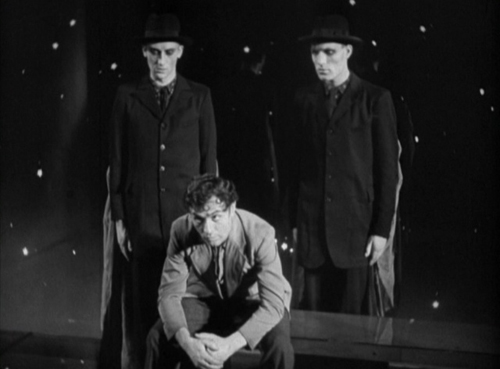The Crystals' "He Hit Me (And It Felt Like A Kiss)" was not quite the last gasp of a certain strain of masochism in popular culture...but it can be usefully cited as probably the last time said strain of masochism was embraced at putatively face value, rather than treated as a symptom of psychological dysfunction or social malaise. It is peculiarly sobering to be reminded that it wasn't all that long ago that the dominant culture deemed spousal abuse as, for all intents and purposes, normal. And it is most terribly peculiar today to confront Ferenc Molnar's 1909 Liliom, a work we would most likely never be confronting anymore were it not for the facts that, A) it became the basis for one of the most beloved musicals in American theater—Rodgers and Hammerstein's Carousel, contemporary interpretations of which do tend to emphasize just how, you'll excuse the term, fucked its central love story is—and, B) it was also adapted by two cinematic masters, Frank Borzage in Hollywood and Fritz Lang in France, soon into the second quarter of the 20th century.
Both pictures have been difficult for contemporary cinephiles to see. In 2004 Kino, with the best of intentions, put out a less-than-optimum DVD of the Lang picture that has been, for all intents and purposes, supplanted by a superior transfer from superior materials issued by Fox as an extra on its DVD set of Carousel. This version was, however, accidentally touted as the one filmed by Borzage in 1930. Which it sure was not. Borzage's version is one of the many treasures included in Fox's wondrous Murnau, Borzage and Fox set of late last year. To watch them side by side is to revel in the contrasting approaches and world views of the two directors. The set-in-Hungary tale pairs crude carnival barker Liliom with Julie, a young woman seeking a passionate connection. She rejects the advances of a bland carpenter, who offers security, and scoffs at her best friend Marie, who marries a dull hotel porter. No, she only has eyes for Liliom, despite his dismissive and frequently cruel behavior. Still...Lilom claims to adore Julie, and he gets a chance to prove it, and prove himself, in the afterlife.
The romantic Borzage approaches the material with more than a straight face. The film, with its fanciful sets that give it the air of a fairy tale even in its earth-bound scenes, finds its focal point in Rose Hobart's Julie. When the couple first meet, Liliom, played by longtime Borzage stalwart Charles Farrell, whose magnetism falters given his weedy voice (this was the first sound picture Farrell and Borzage worked on, and the last) places Julie's face in his hand:

"There's nothing much to you," he says. "Just...two eyes." Indeed, but look at those two eyes.The shot (the cinematographer is Chester Lyons) is a quintessentially Borzageian vision of not just love but the certainty of love. And it underscores the fact that the Borzage and Lang films differ not just in terms of their respective attitudes to the story, but who the story is actually about. Although both films have the same title, Borzage's could just as well be called Julie, as it is clearly she that Borzage is most invested in.
In Lang's picture, Liliom, played by Charles Boyer, takes a much more direct approach to Julie, played by Madeleine Ozeray. The film is very much taken with Liliom's rakishness. bull-headedness, and slow realization of his own sins. Here, probably more in keeping with the intentions of Molnar, Julia is the object, Liliom the subject.

While Borzage clearly sees Julia's all-or-nothing love for Liliom as heroic even in its masochism, he most often frames that love within an isolation that, with piercing clarity, puts across the truth that in such affairs one invariably has to carry enough love to compensate for the other partner's neglect of it. Julie and Liliom set up housekeeping right by the amusement park where they first met, the shot below, of the pregnant Julie looking out at the roller coaster after Liliom embarks on his predictably ill-fated, and short, criminal career, is a remarkably eloquent visual monologue of heartbreak.

In Lang's picture, Liliom's transport to a celestial limbo leaves Julie pretty much behind, the better to present Boyer broadly mugging his character's perplexity. Lang the mordant ironist is at his most cheekily droll in this segment, but in an interview with Peter Bogdanovich years later, the director, while saying he still liked the film, admits to having miscalculated: "...[I]t was shown in a French movie house and the audience went along with the picture in a way you can only hope for, but the moment it started to be comic—when the heavenly messengers came and brought Liliom to heaven—they turned against it. I made the heaven, I think, very funny...[b]ut the audience—because they really felt with Liliom and his wife—wanted to have a drama."

For all the virtues of the Lang picture, Borzage's version is the "really felt" one, which accounts for its peculiar power. We ought to be repulsed when Julia tells her young daughter that someone can "beat you" and still "never hurt you;" instead, the moment is a genuinely moving one.